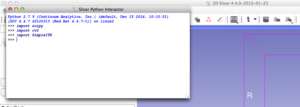Documentation/Labs/SlicerCondaIntegration
Slicer currently builds a custom python distribution from source, but not all useful packages are available. But Anaconda provides a set of binaries that might provide a more comprehensive ecosystem.
Instead of attempting to use the whole Anaconda package, our approach will be to use Miniconda, a reduced version of Anaconda, and (1) install a pre-defined set of packages and (2) provide a way to easily install new ones.
Contents
Update 2016-01-22 (Jorge)
After a follow up with JC about this topic, and due to the apparent complexity of this task, it has been decided to make a small survey to have a better idea of which would be the most needed packages for the community from those ones available in Anaconda.
The link to indicate your preferences is: https://docs.google.com/spreadsheets/d/1j4iugjs0GkHEn1elUbceMW2KJ21FM-QrYoFtZ4P9yOc/edit?usp=sharing
Update 2015-10-10
We (Kitware) did few experiments where we copied the anaconda numpy and SciPy packages into a Slicer build tree and run the associated tests. The link below summarizes the results.
It turns out that there are a lot of issues with this approach.
Next step: We suggest to continue with the initial approach where Slicer is built against miniconda Python libraries.
Virtual Hackfest: August 24, 9am
Info
Location: Google hangout (connection details will be shared on the Slicer developer list)
What: Work on Slicer and Conda integration
Proposed tasks
Review and consolidate contributions of Jorge and Adam
Implement miniconda external project files as outlined below
- Create a Slicer module providing:
- (1) scripted interface to install additional conda package
- (2) UI to provide similar functionality
- Update extension description format to specify python dependencies that could be installed either at build/package time or at run time.
Links
- Jorge:
- Adam:
Compile Slicer against miniconda
Mac
Note: the platform used is MacOSX 10.9.5 with XCode 6
- Download the source code hosted in https://github.com/jonieva/Slicer/tree/Conda
- Build (assuming MacOSX 10.9):
cmake \ -DSlicer_USE_CONDA_python:BOOL=ON \ -DCMAKE_BUILD_TYPE:STRING=Debug \ -DQT_QMAKE_EXECUTABLE:FILEPATH=/usr/bin/qmake \ -DCMAKE_OSX_DEPLOYMENT_TARGET:STRING=10.9 \ -DCMAKE_OSX_SYSROOT:FILEPATH=/Applications/Xcode.app/Contents/Developer/Platforms/MacOSX.platform/Developer/SDKs/MacOSX10.9.sdk \ -DSlicer_BUILD_CLI:BOOL=OFF \ -DSlicer_USE_PYTHONQT_WITH_TCL:BOOL=OFF \ ../Slicer
The only changes in the source code are in Superbuild/External_python.cmake and in Superbuild/External_NUMPY.cmake files (in the current version Slicer will use Anaconda Numpy). For the sake of testing, the next Python Conda modules are installed by default: numpy, scikit-learn.
Issues
- libsqlite3.dylib library in miniconda has a conflict with CTK:
Compiling python scripts: CTKScriptingPythonCore
Compiling python scripts: ctkSimplePythonShell
Linking CXX shared module ../../bin/CTKCorePythonQt.so
dyld: Symbol not found: _sqlite3_intarray_bind
Referenced from: /System/Library/Frameworks/CoreData.framework/Versions/A/CoreData
Expected in: /Users/Jorge/Projects/BWH/Slicer-Superbuild-Conda-Eclipse/python-miniconda/lib/libsqlite3.dylib
in /System/Library/Frameworks/CoreData.framework/Versions/A/CoreData
dyld: Symbol not found: _sqlite3_intarray_bind
Referenced from: /System/Library/Frameworks/CoreData.framework/Versions/A/CoreData
Expected in: /Users/Jorge/Projects/BWH/Slicer-Superbuild-Conda-Eclipse/python-miniconda/lib/libsqlite3.dylib
in /System/Library/Frameworks/CoreData.framework/Versions/A/CoreData
Workaround: delete or rename the file (there is a hack included in the External_python.cmake file to this end).
- When running Slicer.app (not the binary file in Slicer-Superbuild-Conda/Slicer-build) the program is not using Miniconda, but the System Python, so it doesn't find the right libraries:
Python 2.7.5 (default, Mar 9 2014, 22:15:05)
[GCC 4.2.1 Compatible Apple LLVM 5.0 (clang-500.0.68)] on darwin
>>> Traceback (most recent call last):
File "<string>", line 1, in <module>
File "/Users/Jorge/Projects/BWH/Slicer-Superbuild-Conda/Slicer-build/lib/Slicer-4.4/qt-scripted-modules/SimpleFilters.py", line 3, in <module>
import SimpleITK as sitk
File "/Library/Python/2.7/site-packages/SimpleITK-0.9.0.dev656-py2.7-macosx-10.9-intel.egg/SimpleITK/__init__.py", line 1, in <module>
from .SimpleITK import *
File "/Library/Python/2.7/site-packages/SimpleITK-0.9.0.dev656-py2.7-macosx-10.9-intel.egg/SimpleITK/SimpleITK.py", line 28, in <module>
_SimpleITK = swig_import_helper()
File "/Library/Python/2.7/site-packages/SimpleITK-0.9.0.dev656-py2.7-macosx-10.9-intel.egg/SimpleITK/SimpleITK.py", line 24, in swig_import_helper
_mod = imp.load_module('_SimpleITK', fp, pathname, description)
ImportError: dlopen(/Library/Python/2.7/site-packages/SimpleITK-0.9.0.dev656-py2.7-macosx-10.9-intel.egg/SimpleITK/_SimpleITK.so, 2): Library not loaded: libSimpleITKBasicFilters12-0.9.1.dylib
Referenced from: /Library/Python/2.7/site-packages/SimpleITK-0.9.0.dev656-py2.7-macosx-10.9-intel.egg/SimpleITK/_SimpleITK.so
Reason: image not found
So, in order that the system works, Slicer must be started from a terminal running the file Slicer-Superbuild-Conda/Slicer-build/Slicer
Linux
- Download the source code in https://github.com/jonieva/Slicer/tree/Conda
- Build Slicer normally, except for the setting Slicer_USE_CONDA_python. Example:
cmake \ '''-DSlicer_USE_CONDA_python:BOOL=ON''' \ -DCMAKE_BUILD_TYPE:STRING=Debug \ -DQT_QMAKE_EXECUTABLE:FILEPATH=/usr/bin/qmake \ -DSlicer_BUILD_CLI:BOOL=OFF \ -DSlicer_USE_PYTHONQT_WITH_TCL:BOOL=OFF \ ../Slicer
Different approach
2015-02-04 - Steve Pieper
The following worked for me (Steve Pieper, 2015-02-04) using ubuntu 13.10 and miniconda 3.8.4-py27_0
cmake \
-DCMAKE_BUILD_TYPE:STRING=Debug \
-DQT_QMAKE_EXECUTABLE:FILEPATH=/usr/bin/qmake \
-DPYTHON_EXECUTABLE:FILEPATH=${HOME}/miniconda/bin/python \
-DPYTHON_INCLUDE_DIR:PATH=${HOME}/miniconda/include/python2.7 \
-DPYTHON_LIBRARY:FILEPATH=${HOME}/miniconda/lib/libpython2.7.so \
-DSlicer_BUILD_CLI:BOOL=OFF \
-DSlicer_USE_PYTHONQT_WITH_TCL:BOOL=OFF \
../Slicer
make -j20
export PYTHONHOME=${USER}/miniconda
./Slicer-build/Slicer
But after it ran there was slicer's build of numpy inside miniconda, so I needed to do this:
bin/conda uninstall numpy bin/conda install numpy
I tried using this:
-DSlicer_USE_SYSTEM_NUMPY:BOOL=ON
but got this error:
... -- SuperBuild - CTKAPPLAUNCHER[OK] (SYSTEM) CMake Error at SuperBuild/External_CTKAPPLAUNCHER.cmake:21 (message): Enabling Slicer_USE_SYSTEM_CTKAPPLAUNCHER is not supported ! Call Stack (most recent call first): CMake/ExternalProjectDependency.cmake:561 (include) SuperBuild/External_python.cmake:21 (ExternalProject_Include_Dependencies) CMake/ExternalProjectDependency.cmake:561 (include) SuperBuild/External_VTKv6.cmake:11 (ExternalProject_Include_Dependencies) CMake/ExternalProjectDependency.cmake:561 (include) SuperBuild/External_teem.cmake:11 (ExternalProject_Include_Dependencies) CMake/ExternalProjectDependency.cmake:561 (include) CMake/ExternalProjectDependency.cmake:607 (ExternalProject_Include_Dependencies) SuperBuild.cmake:320 (ExternalProject_Include_Dependencies) CMakeLists.txt:599 (include)
-- Configuring incomplete
2015-03-02 - Jc
2015-03-02(Jc): To simplify even further, using Slicer >= r24007, the following is expected to work. It is not needed to manually remove Numpy.
This is achieved by specifying -DSlicer_USE_SYSTEM_NUMPY:BOOL=1 and also by specifying all dependencies of NUMPY (python, zlib, OpenSSL and CTKAPPLAUNCHER) should not be expected on the system.
Note also that since I built Qt against the latest version of OpenSSL in the 1.0.1 series, I explicitly add -DOPENSSL_DOWNLOAD_VERSION:STRING=1.0.1l
QT_QMAKE_EXECUTABLE=/home/jcfr/Support/qt-everywhere-opensource-release-build-4.8.6/bin/qmake
CONDA_ROOT=/home/jcfr/Projects/sandbox
cmake \
-DCMAKE_BUILD_TYPE:STRING=Release \
-DQT_QMAKE_EXECUTABLE:FILEPATH=${QT_QMAKE_EXECUTABLE} \
-DPYTHON_EXECUTABLE:FILEPATH=${CONDA_ROOT}/miniconda/bin/python \
-DPYTHON_INCLUDE_DIR:PATH=${CONDA_ROOT}/miniconda/include/python2.7 \
-DPYTHON_LIBRARY:FILEPATH=${CONDA_ROOT}/miniconda/lib/libpython2.7.so \
-DSlicer_USE_PYTHONQT_WITH_OPENSSL:BOOL=1 \
-DOPENSSL_DOWNLOAD_VERSION:STRING=1.0.1l \
-DSlicer_USE_SYSTEM_CTKAPPLAUNCHER:BOOL=0 \
-DSlicer_USE_SYSTEM_OpenSSL:BOOL=0 \
-DSlicer_USE_SYSTEM_zlib:BOOL=0 \
-DSlicer_USE_SYSTEM_python:BOOL=0 \
-DSlicer_USE_SYSTEM_NUMPY:BOOL=1 \
-DSlicer_BUILD_CLI:BOOL=OFF \
-DSlicer_USE_PYTHONQT_WITH_TCL:BOOL=OFF \
../Slicer
nice make -j4
Windows
Although the code in https://github.com/jonieva/Slicer/tree/Conda should work with Windows too (using the setting Slicer_USE_CONDA_python=ON), it has not been tested at the moment.
Compile Slicer and python 2.7.10 + drop in conda binary packages
Initial experiments
TBD
Next steps
Phase 1
Copied from the conclusion of the Developer hangout of March 24th 2015
- Python conda - next steps:
- Create External_miniconda.cmake
- Add a variable named EXTERNAL_PYTHON_NAME that could take two values: python or miniconda
- In the SuperBuild.cmake, an option named EXTERNAL_PYTHON_NAME could be added. By default, it would be set to "python" but could switch to "miniconda"
- Projects like External_{CTK, VTK}.cmake would be updated to depend on ${EXTERNAL_PYTHON_NAME}
- For now, let's consider only the case OpenSSL disabled.
![]() See https://github.com/jcfr/Slicer/tree/slicer-miniconda
See https://github.com/jcfr/Slicer/tree/slicer-miniconda
Phase 2
TBD
